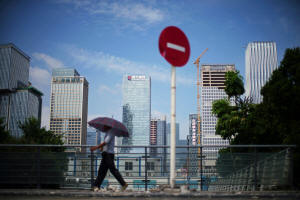Evergrande seeks US court nod for $32 billion debt overhaul as China
economic fears mount
 Send a link to a friend
Send a link to a friend
 [August 18, 2023] By
Clare Jim, Jonathan Stempel and Dietrich Knauth [August 18, 2023] By
Clare Jim, Jonathan Stempel and Dietrich Knauth
HONG KONG/NEW YORK (Reuters) - Embattled developer China Evergrande
Group has filed for U.S. bankruptcy protection as part of one of the
world's biggest debt restructurings, as anxiety grows over China's
worsening property crisis and its impact on the weakening economy.
China unexpectedly lowered several key interest rates earlier this week
in a bid to shore up struggling activity and is expected to cut prime
loan rates on Monday, but analysts say moves so far have been too
little, too late, with much more forceful measures needed to stem the
economy's downward spiral.
Once China's top-selling developer, Evergrande has become the poster
child of an unprecedented debt crisis in the country's property sector,
which accounts for roughly a quarter of the economy, after facing a
liquidity crunch in mid-2021.
The developer has sought protection under Chapter 15 of the U.S.
bankruptcy code, which shields non-U.S. companies that are undergoing
restructurings from creditors that hope to sue them or tie up assets in
the United States.
While the step is seen as procedural, it indicates that the company is
nearing the end of its restructuring process after more than one and a
half years of negotiations with creditors.

Evergrande said in a filing on Friday that it will ask the U.S. court
for recognition of schemes of arrangement under the offshore debt
restructuring for Hong Kong and the British Virgin Islands as its dollar
notes are governed by New York law.
"The application is a normal procedure for the offshore debt
restructuring and does not involve (a) bankruptcy petition," it said in
the filing, adding it is pushing forward with its offshore debt
restructuring.
The company proposed scheduling a Chapter 15 recognition hearing for
Sept. 20.
Evergrande's offshore debt restructuring involves a total of $31.7
billion, which include bonds, collateral and repurchase obligations. It
will meet with creditors later this month on its restructuring proposal.
A string of Chinese property developers have defaulted on their offshore
debt obligations since Evergrande ran into trouble, leaving unfinished
homes and unpaid suppliers, shattering consumer confidence in the
world's second-largest economy. Property investment, sales and new
construction starts have been contracting for over a year.
DOMINO EFFECT?
The property crisis has also fanned worries about contagion risks to the
financial system, which could have a destabilising impact on an economy
already weakened by tepid domestic and foreign demand, faltering factory
activity and rising unemployment.
A major Chinese asset manager has missed repayment obligations on some
investment products and warned of a liquidity crisis, while Country
Garden, the country's No.1 private developer, has become the latest to
flag a stifling cash crunch.
Angry investors in trust products of Zhongrong International Trust Co.,
a unit of the asset manager, have lodged complaint letters with
regulators, pleading with the authorities to step in after the trust
firm missed payments.

[to top of second column] |

A man walks past a No Entry traffic sign
near the headquarters of China Evergrande Group in Shenzhen,
Guangdong province, China September 26, 2021. REUTERS/Aly Song/File
Photo

Nomura on Friday followed some of the major global brokerages to cut
China's growth forecast for this year. It now sees China's gross
domestic product (GDP) growing 4.6% this year, down from an earlier
forecast of 5.1%, but much of that growth may have come in the first
quarter after strict COVID curbs were lifted.
China is targeting 5% growth for this year, but an increasing number
of economists are warning that it could miss the goal unless Beijing
ramps up support measures.
China's economic and property woes and the absence of concrete
stimulus steps have sent a chill through global markets. Asian
shares posted a third straight week of declines. Chinese blue-chips
dropped 1.2% on Friday and Hong Kong's Hang Seng Index slumped 2.1%.
In an attempt to boost investor confidence, China securities
regulator said on Friday it would cut trading costs and support
share buybacks as it unveiled measures aimed at reviving the stock
market.
But so far, the scope of support that Beijing has offered has
underwhelmed financial markets, with some analysts wondering if
policymakers are reluctant to risk adding to a mountain of debt
created in part by massive stimulus in the past.
"To be sure, the economic downturn is putting a great deal of strain
on financial sector balance sheets, and it does increase the risk of
a messy policy mistake if officials donít handle the situation with
care. But we still think a full-blown financial crisis is a tail
risk rather than a probable outcome," Capital Economics said in a
report.
DEBT RESTRUCTURING
China's central bank reiterated it would adjust and optimise
property policies, according to its quarterly policy implementation
report this week.

Since mid-2021, companies accounting for 40% of Chinese home sales
have defaulted, most of them private property developers.
Longfor Group, China's second largest private developer, said on
Friday it would try to boost profitability in response to changing
supply and demand.
The Beijing-based developer posted a 0.6% rise in first-half core
profit, and said it would strive to return to positive cash flow
this year and not take on new interest-bearing debt.
"The China property sector is like a black hole, so many developers
have been dragged into it since two years ago after Evergrande,"
said Winner Zone Asset Management CEO and CIO Alan Luk.
"The central government has yet to introduce (strong) measures
because this is too large a hole to fill."
(Reporting by Clare Jim in Hong Kong, Jonathan Stempel and Dietrich
Knauth in New York, and Manya Saini in Bengaluru; Writing by Sumeet
Chatterjee; Editing by Shri Navaratnam and Kim Coghill)
[© 2023 Thomson Reuters. All rights
reserved.]
This material may not be published,
broadcast, rewritten or redistributed.
Thompson Reuters is solely responsible for this content. |